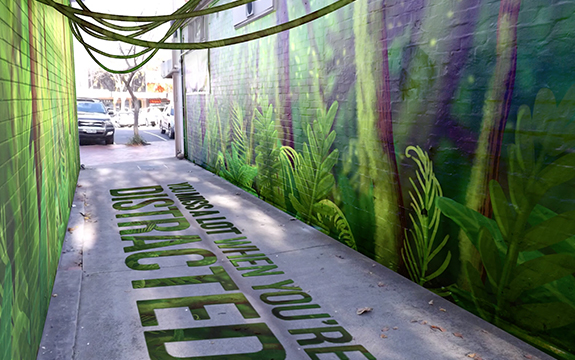Students release wild animals in Melbourne to teach us a lesson

CBD alleyways are jungles in student campaign, by design honours students Hughes, Xavier, Powell and Pritchard
Swinburne Communication Design (Honours) students released wild animals in Melbourne’s CBD to prove how distracted drivers can miss ‘rare sightings’ like cyclists, pedestrians and other vehicles.
The Melbourne Re:act behaviour change program campaign topic for 2020 is - distraction. Seven teams from Swinburne created campaigns this year. The winning Swinburne campaign, “You miss a lot when you are distracted”, showed how vulnerable road users could potentially be so oblivious they’d miss wild animals roaming the streets in the city.

A wild cheetah highlights the danger of distraction in campaign by design honours students Hughes, Xavier, Powell and Pritchard
The annual Re:act program inspires students to design a behaviour change campaign to raise awareness in 18-25 year old drivers. The program is an initiative of creative behaviour change agency, Hard Edge. The program runs Australia-wide and has expanded into the UK this year.
“Everybody was engaged with the program throughout the whole process, despite the challenges of COVID-19 restrictions - industry partners, who obviously faced changed working circumstances and home schooling; the students, who were working as groups but remotely in isolation; and Swinburne, who did a fantastic job to keep the program
moving forward in its fifth year,” says Andrew Hardwick, Re:act Founder and Hard Edge Managing Director.
The “You miss a lot when you are distracted” campaign was created by third year honours students in Communication Design – Laura Hughes, Caitlin Xavier, Stephanie Powell and Thomas Pritchard. The students worked to create a campaign that avoided typical cautionary messaging with a focus on pedestrians. The campaign features the use of the colours of wild animals and correlations to road safety dangers, such as vehicles.

Wild animals as street art highlight distraction, by Hughes, Xavier, Powell and Pritchard
“The selected campaign displayed insightful thinking to be able to make the audience look at something that’s out of place, while at the same time relate it to something that is present that they need to pay attention to. It showed very clever treatment of colour to highlight the animal and vehicle, and the campaign was very Melbourne-centric in its activation,” says Hardwick.

Colours and images of the crocodile, cheetah and fox used for impact, by students Hughes, Xavier, Powell and Pritchard
“We wanted to stay away from using overly cautionary, scary tactics and so we created something lighter in ‘You miss a lot when you’re distracted’. We leveraged the idea out to be applied to still symbolically dangerous but less abrasive things. We used crocodiles, cheetahs as images that are associated with danger but still have visual impact, to symbolise other things. Crossing a road on a red signal was symbolised by a coral snake, the cheetah represented a car, that sort of thing,” explains Laura Hughes, Swinburne Communication Design student.

Coral snake symbolises red stop light, by students Hughes, Xavier, Powell and Pritchard
“We decided to focus on pedestrians because we didn’t find a lot in our research about them. There is a lot of data about distraction and cars and quite a bit on cyclists and motorcyclists. Pedestrians were a big road user group that wasn’t talked about as much,” she adds.

Cassowary and fox images support warning to pedestrians, by students Hughes, Xavier, Powell and Pritchard
Animated characters representing specific distractions featured in another student campaign called “The Distractors” and a third “You wouldn’t do this distracted” campaign, uses activities you wouldn’t normally do while distracted as examples, like sex, making speeches and playing sport. Both of these campaigns impressed Re:act industry partners.
Re:act founder and CEO Andrew Hardwick said the standard of the campaigns for Melbourne 2020 was very high. The quality and creativity was also praised by Re:act industry partners including Australia Post, TAC, RACV, Telstra, Transurban, VicRoads and NRSPP.
With funding from the Re:act program, the students behind each selected campaign will work with the support of Hard Edge to launch their campaigns on their respective university campuses.
Re:act media partner, oOh!media, is providing support this year and will run the campaigns in each Australian city across hundreds of their digital assets, including its landmark billboards.
The third-year honours students, supported by Swinburne’s Deputy Chair of Communication Design Anthony Elliott, presented their campaigns via Zoom to industry representatives from Australia Post, TAC, RACV, Telstra, Transurban, VicRoads and the National Road Safety Partnership Program (NRSPP) in May.
“Usually the students present at Hard Edge. This year they developed video presentations which were presented with a Q&A session afterwards,” explains Associate Professor, Nicki Wragg, Chair of Communication Design at Swinburne.
-
Media Enquiries
Related articles
-

- University
- Media and Communication
Swinburne University of Technology partners with Grande Experiences and THE LUME Melbourne for cutting-edge Immersive Media education
Swinburne University of Technology is proud to announce its partnership with Grande Experiences and THE LUME Melbourne, enhancing the future of Immersive Media education.
Thursday 13 June 2024 -

- Design
Historical armour inspires contemporary architecture
Swinburne PhD candidate Nabila Afif is using chainmail as inspiration to create flexible, reconfigurable and transportable architectureTuesday 31 October 2023 -

- Design
Swinburne design alum changing the world one idea at a time
Swinburne communication design alum Trinity Ross, at the helm of her own creative agency, believes that creativity and design can change the world.
Friday 01 September 2023 -

- Design
Motion art captures city life and multiple design awards
A Swinburne motion design team has taken data from the lives of everyday Melburnians and transformed it into award-winning living artwork.
Friday 17 March 2023 -

- Design
Design alum turns side hustle into high-end architectural products business
Swinburne alum John Terziovski has turned his lifelong interest in building and construction into a thriving business designing bespoke high-end architectural items.
Tuesday 04 April 2023

